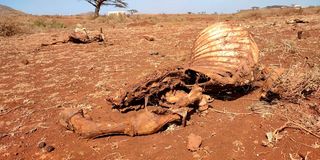Less of words, more of action on drought

A trail of dead livestock at Hurri Hills in Marsabit County due to the ravages of prolonged drought.
The socioeconomic effects of the widespread drought are enormous. Statistics indicate that more than four million Kenyans face starvation due to the prolonged drought in at least 23 counties, roughly half of the country.
Livestock and wildlife have not been spared either with a million animals dead. In March, 3.5 million people were hungry and 636,000 malnourished. The drought is among factors blamed for the high cost of living, hopelessness and desperation.
SDG 2 seeks to end hunger, achieve food security and improved nutrition, and promote sustainable agriculture. But FAO projects global food demand to increase by at least 60 per cent above the 2006 levels in 2050 . WHO data show climate change could cause 250,000 additional deaths yearly from heat stress, malnutrition, malaria and diarrhoea in 2030-2050.
Kenya’s population is projected to spike to 96 million by 2050. That calls for climate-smart agriculture and strategic planning to feed the people.
Ahead of the November 6-18 COP27 in Egypt, there is unprecedented urgency to mitigate the climate catastrophe. The “State of the Climate Change” report shows climate change could further lower GDP in Sub-Saharan Africa by up to three per cent by 2050. Ironically, the World Bank says the region accounts for a paltry 2.27 per cent of the world’s carbon dioxide emissions, compared to the US and the EU at 14.54 per cent and 8.97 per cent, respectively.
Developed industrialised countries are the worst environmental villains. It thus behoves them to expedite their $100 billion (Sh12 trillion) a year financial support promise to the most vulnerable and affected countries a decade ago. Withholding it is like signing the death warrant. Translate promises into action lest we are thrust into a doomsday scenario.
Lastly, and most importantly, humans are responsible for the runaway climate crisis. Drastic change is needed if the environmental apocalypse is to be avoided. Reclaiming and safeguarding our environment is our collective and individual responsibility.
Mr Muthama is a business and strategic management lecturer at JKUAT, consultant and author. [email protected].





